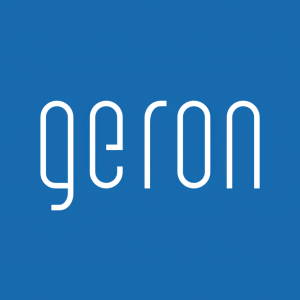Geron Announces Phase 1 Findings from Two-Part IMproveMF Study Presented at ASH Suggesting Tolerability of RYTELO™ (imetelstat) in Combination with Ruxolitinib as Frontline Therapy in Patients with Myelofibrosis
- In the dose escalation Part 1 of the study, no dose-limiting toxicities were observed and the PK profiles were similar to those reported for previous monotherapy studies of imetelstat and ruxolitinib
- Based on the safety profile, imetelstat 9.4 mg/kg dosed every four weeks with ruxolitinib was the selected dose for the dose expansion Part 2 of the study, which is currently enrolling patients
-
Geron is also evaluating the potential of imetelstat in the separate Phase 3 IMpactMF trial of patients with JAKi relapsed/refractory MF, which is >
70% enrolled
“As a telomerase inhibitor, the potential of imetelstat to affect the malignant clone differentiates it from any other drug currently approved or in development for myelofibrosis treatment. These early results also support the potential tolerability of imetelstat and ruxolitinib as a combination therapy and could have significant implications for future development efforts,” said Faye Feller, M.D., Executive Vice President, Chief Medical Officer of Geron. “Given these early findings from the IMproveMF study presented at ASH, we are now enrolling Part 2 of the study for dose confirmation and expansion at the highest dose level, imetelstat 9.4 mg/kg every 4 weeks, to further explore and confirm this dosing and schedule in combination with ruxolitinib as a potential frontline therapy in MF.”
“Upon diagnosis, intermediate-1 and -2 and high-risk myelofibrosis patients typically receive ruxolitinib as the primary therapy, which reduces enlarged spleens and alleviates symptoms. These early results showing the tolerability of ruxolitinib combined with imetelstat in this patient population are highly encouraging, because as a non-JAK inhibitor treatment option with a potentially novel mechanism of action, imetelstat could provide an additive benefit, affecting the underlying malignant clones implicated in MF progression, when combined with ruxolitinib alone,” said John Mascarenhas, M.D., Professor of Medicine at the Icahn School of Medicine at Mount Sinai and a principal investigator on the IMproveMF study, who delivered the oral presentation at ASH.
IMproveMF is an ongoing, multicenter Phase 1/1b trial that aims to evaluate the safety, pharmacokinetics (PK), and clinical activity of imetelstat in combination with ruxolitinib in patients with INT-1/INT-2/HR MF. As of the November 4, 2024 cutoff date, at least three patients had received each imetelstat dose level: Dose Level 1, imetelstat 4.7 mg/kg (n=3); Dose Level 2, imetelstat 6.0 mg/kg (n=3); Dose Level 3, imetelstat 7.5 mg/kg (n=4); and Dose Level 4, imetelstat 9.4 mg/kg (n=7). Ruxolitinib doses were individualized per patient. The PK profiles of imetelstat and ruxolitinib were consistent with previous monotherapy studies of imetelstat and ruxolitinib. At the time of this analysis, the median duration of imetelstat treatment for the seven patients in the imetelstat 9.4 mg/kg cohort was 12.1 weeks (range: 4.1-20.9 weeks).
The combination of imetelstat with ruxolitinib was well-tolerated, and no dose-limiting toxicities were reported at any imetelstat dose level within the first 28 days of Cycle 1. Grade 3 treatment-emergent adverse events (TEAEs) were reported in
For patients in the 9.4 mg/kg imetelstat dose level selected for dose expansion in Part 2 of the study, hematology values, including hemoglobin, leukocytes, neutrophils and platelets, were stable over time. Across all four dose cohorts, average absolute change from baseline total symptom score (TSS) over week 12 was a median of –5 and maximum absolute reduction from baseline TSS up to Week 24 was a median of –5. A trend for dose-dependent spleen volume reduction (SVR) at Week 24 was observed in the first three doses. Further evidence is needed in the 9.4 mg/mg dose where Week 24 data were not available at the time of this analysis. Preliminary results showed variant allele frequency (VAF) reductions in JAK2, CALR, MPL and high molecular risk driver mutations across the four dose cohorts.
IMproveMF is actively enrolling patients for dose confirmation and expansion (NCT05371964). In parallel, the separate IMpactMF Phase 3 trial is ongoing in MF patients who are relapsed/refractory to JAK inhibitors (NCT04576156). This Phase 3 trial is designed to confirm the results from the IMbark Phase 2 study, where single-agent imetelstat treatment resulted in multiple clinically meaningful benefits, including symptom response and potential improvement in overall survival.
The ASH presentation, titled “Trial Update from IMproveMF, an Ongoing, Open-Label, Dose-Escalation and -Expansion, Phase 1/1B Trial to Evaluate the Safety, Pharmacokinetics, and Clinical Activity of the Novel Combination of Imetelstat with Ruxolitinib in Patients with Intermediate-1, Intermediate-2, or High-Risk Myelofibrosis (MF),” is available on Geron’s website in the investor section under publications.
About RYTELO™ (imetelstat)
RYTELO™ (imetelstat) is an FDA-approved oligonucleotide telomerase inhibitor for the treatment of adult patients with low-to-intermediate-1 risk myelodysplastic syndromes (LR-MDS) with transfusion-dependent anemia requiring four or more red blood cell units over eight weeks who have not responded to or have lost response to or are ineligible for erythropoiesis-stimulating agents (ESAs). It is indicated to be administered as an intravenous infusion over two hours every four weeks.
RYTELO is a first-in-class treatment that works by inhibiting telomerase enzymatic activity. Telomeres are protective caps at the end of chromosomes that naturally shorten each time a cell divides. In LR-MDS, abnormal bone marrow cells often express the enzyme telomerase, which rebuilds those telomeres, allowing for uncontrolled cell division. Developed and exclusively owned by Geron, RYTELO is the first and only telomerase inhibitor approved by the
IMPORTANT SAFETY INFORMATION
WARNINGS AND PRECAUTIONS
Thrombocytopenia
RYTELO can cause thrombocytopenia based on laboratory values. In the clinical trial, new or worsening Grade 3 or 4 decreased platelets occurred in
Monitor patients with thrombocytopenia for bleeding. Monitor complete blood cell counts prior to initiation of RYTELO, weekly for the first two cycles, prior to each cycle thereafter, and as clinically indicated. Administer platelet transfusions as appropriate. Delay the next cycle and resume at the same or reduced dose, or discontinue as recommended.
Neutropenia
RYTELO can cause neutropenia based on laboratory values. In the clinical trial, new or worsening Grade 3 or 4 decreased neutrophils occurred in
Monitor patients with Grade 3 or 4 neutropenia for infections, including sepsis. Monitor complete blood cell counts prior to initiation of RYTELO, weekly for the first two cycles, prior to each cycle thereafter, and as clinically indicated. Administer growth factors and anti-infective therapies for treatment or prophylaxis as appropriate. Delay the next cycle and resume at the same or reduced dose, or discontinue as recommended.
Infusion-Related Reactions
RYTELO can cause infusion-related reactions. In the clinical trial, infusion-related reactions occurred in
Premedicate patients at least 30 minutes prior to infusion with diphenhydramine and hydrocortisone as recommended and monitor patients for one hour following the infusion as recommended. Manage symptoms of infusion-related reactions with supportive care and infusion interruptions, decrease infusion rate, or permanently discontinue as recommended.
Embryo-Fetal Toxicity
RYTELO can cause embryo-fetal harm when administered to a pregnant woman. Advise pregnant women of the potential risk to a fetus. Advise females of reproductive potential to use effective contraception during treatment with RYTELO and for 1 week after the last dose.
ADVERSE REACTIONS
Serious adverse reactions occurred in
Most common adverse reactions (≥
Please see RYTELO (imetelstat) full Prescribing Information, including Medication Guide, available at https://pi.geron.com/products/US/pi/rytelo_pi.pdf.
About Geron
Geron is a commercial-stage biopharmaceutical company aiming to change lives by changing the course of blood cancer. Our first-in-class telomerase inhibitor RYTELO™ (imetelstat) is approved in
Use of Forward-Looking Statements
Except for the historical information contained herein, this press release contains forward-looking statements made pursuant to the “safe harbor” provisions of the Private Securities Litigation Reform Act of 1995. Investors are cautioned that such statements, include, without limitation, those regarding: (i) that the potential of imetelstat to affect the malignant clone differentiates it from any other drug currently approved or in development for myelofibrosis treatment; (ii) that the early results from IMproveMF support the potential tolerability of imetelstat and ruxolitinib as a combination therapy and could have significant implications for future development efforts; (iii) that the early results from IMproveMF showing the tolerability of ruxolitinib combined with imetelstat in the studied patient population are highly encouraging, because as a non-JAK inhibitor treatment option with a potentially novel mechanism of action, imetelstat could provide an additive benefit, affecting the underlying malignant clones implicated in MF progression, when combined with ruxolitinib alone; and (iv) other statements that are not historical facts, constitute forward-looking statements. These forward-looking statements involve risks and uncertainties that can cause actual results to differ materially from those in such forward-looking statements. These risks and uncertainties, include, without limitation, risks and uncertainties related to: (a) whether Geron is successful in commercializing RYTELO (imetelstat) for the treatment of certain patients with LR-MDS with transfusion dependent anemia; (b) whether Geron overcomes potential delays and other adverse impacts caused by enrollment, clinical, safety, efficacy, technical, scientific, intellectual property, manufacturing and regulatory challenges in order to have the financial resources for and meet expected timelines and planned milestones; (c) whether regulatory authorities permit the further development of imetelstat on a timely basis, or at all, without any clinical holds; (d) whether any future safety or efficacy results of imetelstat treatment cause the benefit-risk profile of imetelstat to become unacceptable; (e) whether imetelstat actually demonstrates disease-modifying activity in patients and the ability to target the malignant stem and progenitor cells of the underlying disease; (f) that Geron may seek to raise substantial additional capital in order to continue the development and commercialization of imetelstat; (g) whether Geron meets its post-marketing requirements and commitments in the
View source version on businesswire.com: https://www.businesswire.com/news/home/20241210472216/en/
Aron Feingold
Vice President, Investor Relations and Corporate Communications
Kristen Kelleher
Associate Director, Investor Relations and Corporate Communications
investor@geron.com
media@geron.com
Source: Geron Corporation








